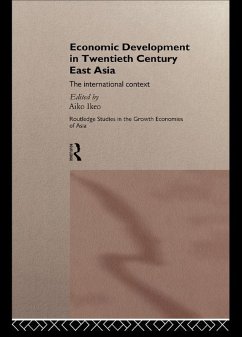
Capitalist Development in the Twentieth Century (eBook, PDF)
An Evolutionary-Keynesian Analysis
Versandkostenfrei!
Sofort per Download lieferbar
36,95 €
inkl. MwSt.
Weitere Ausgaben:

PAYBACK Punkte
18 °P sammeln!
Capitalism in the twentieth century was marked by periods of persistent bad performance alternating with episodes of good performance. A lot of economic research ignores this phenomenon; other work concentrates almost exclusively on developing technology as its cause. This 2001 book draws upon Schumpeterian, Institutional and Keynesian economics to investigate how far these swings in performance can be explained as integral to capitalist development. The authors consider the macroeconomic record of the developed capitalist economies over the past 100 years (including rates of growth, inflation...
Capitalism in the twentieth century was marked by periods of persistent bad performance alternating with episodes of good performance. A lot of economic research ignores this phenomenon; other work concentrates almost exclusively on developing technology as its cause. This 2001 book draws upon Schumpeterian, Institutional and Keynesian economics to investigate how far these swings in performance can be explained as integral to capitalist development. The authors consider the macroeconomic record of the developed capitalist economies over the past 100 years (including rates of growth, inflation and unemployment) as well as the interaction of economic variables with the changing structural features of the economy in the course of industrialization and transformation. This approach allows for changes both in the economic structure and in the economic variables to be generated within the system. This study will be essential reading for macroeconomists and economic historians.
Dieser Download kann aus rechtlichen Gründen nur mit Rechnungsadresse in A, B, BG, CY, CZ, D, DK, EW, E, FIN, F, GR, HR, H, IRL, I, LT, L, LR, M, NL, PL, P, R, S, SLO, SK ausgeliefert werden.













